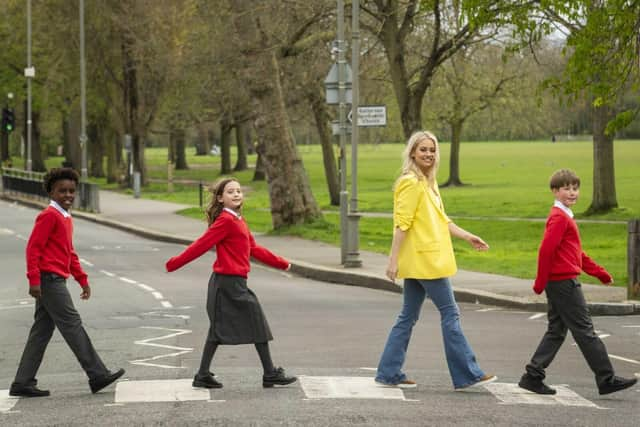Kimberly Wyatt and THINK! help parents prepare children for Safe Adventures
and live on Freeview channel 276
THINK!launched its ‘Safe Adventures’ campaign this week, helping parents across the country prepare their children for independent travel when they move to secondary school.
Recent research from THINK! reveals that despite two in five (40 per cent) of parents letting their child aged 9-11 travel to school independently, almost a third (31 per cent) of parents are not confident that their child is equipped to travel independently.
Advertisement
Hide AdAdvertisement
Hide AdThe ‘Safe Adventures’ campaign is a new initiative from THINK! to raise awareness of the key road safety risks for children embarking on independent journeys to new schools. The campaign is encouraging parents to undertake practice journeys over the holidays, model best practice and to have a road safety conversation as part of their children’s preparation for changing schools.


Road casualty data shows that child pedestrian casualties more than double between the ages of 9 to 11. With the latest road casualty statistics showing that failure to look properly, pedestrians being careless or in a hurry and crossing the road by parked vehicles are the leading contributory factors for pedestrian casualties of children 0-15.
During practice walks, children are therefore being encouraged to use three key road safety rules: ‘EYES UP, SLOW DOWN, CROSS SAFELY’.
- ‘EYES UP’ prompts children to put their phone away, look out for their friends and not distract them. Children should stay focused near traffic, look right, left and right again before crossing the road and continue looking and listening while they cross.
Advertisement
Hide AdAdvertisement
Hide Ad- ‘SLOW DOWN’ advises children to take care and don’t run across the road when traffic is coming even if you think there is time. It can be difficult to judge the speed of traffic. If traffic is coming let it pass.
- ‘CROSS SAFELY’ reminds children to always find a safe place to cross, use a pedestrian crossing if there is one and choose a place where you can see clearly in all directions. Crossing between parked vehicles is hazardous and should be avoided where possible. Use the outside edge of the vehicles as if they were the kerb, stop there and check for traffic before entering the road. Check the vehicles are not about to move off, look for drivers in the cars, lights and listen for engines running. When getting off the bus, wait for the bus to leave so you have a clear view and can be seen by other road users.
Around half of parents with children aged 9-11 (50 per cent) expressed concern around their child not concentrating during their independent journey to school, yet less than half (43 per cent) of parents have had conversations with their child about independent travel to school. Almost a quarter of parents surveyed (22 per cent) are yet to do a practice journey with their child, and only 15 per cent of parents are planning to do a practice journey with their child during the Easter break.
Kimberly Wyatt, who is supporting the campaign, said:
“I have a nine-year old daughter and my other children are growing up each day – it’s so important for parents everywhere to practice road safety with their children before they start a new stage in their school lives. Children can learn about these behaviours on the go so they can stay safer, taking them through the road safety rules and practising good road safety behaviours myself helps my daughter learn and prepare her for the big step toward secondary school.
Advertisement
Hide AdAdvertisement
Hide AdStarting by following these easy steps, my daughter will be better equipped to embark on adventures safely, and I will have peace of mind that she is now more aware of the key risks”
Transport Secretary Mark Harper said:
“Everyone has a role to play in keeping children safe on our roads, so I hope this new initiative from THINK! helps parents put pedestrian safety into practice, improving road safety with the ultimate aim of saving lives.”
‘Safe Adventures’ from THINK! helps parents and their children understand road safety and carry out practice walks to prepare for independent travel. The campaign marks the first wave of activity to tackle the issue, with the Easter holiday being the perfect time to practice key safety rules. Find out more at: https://www.think.gov.uk/campaign/safe-adventures/